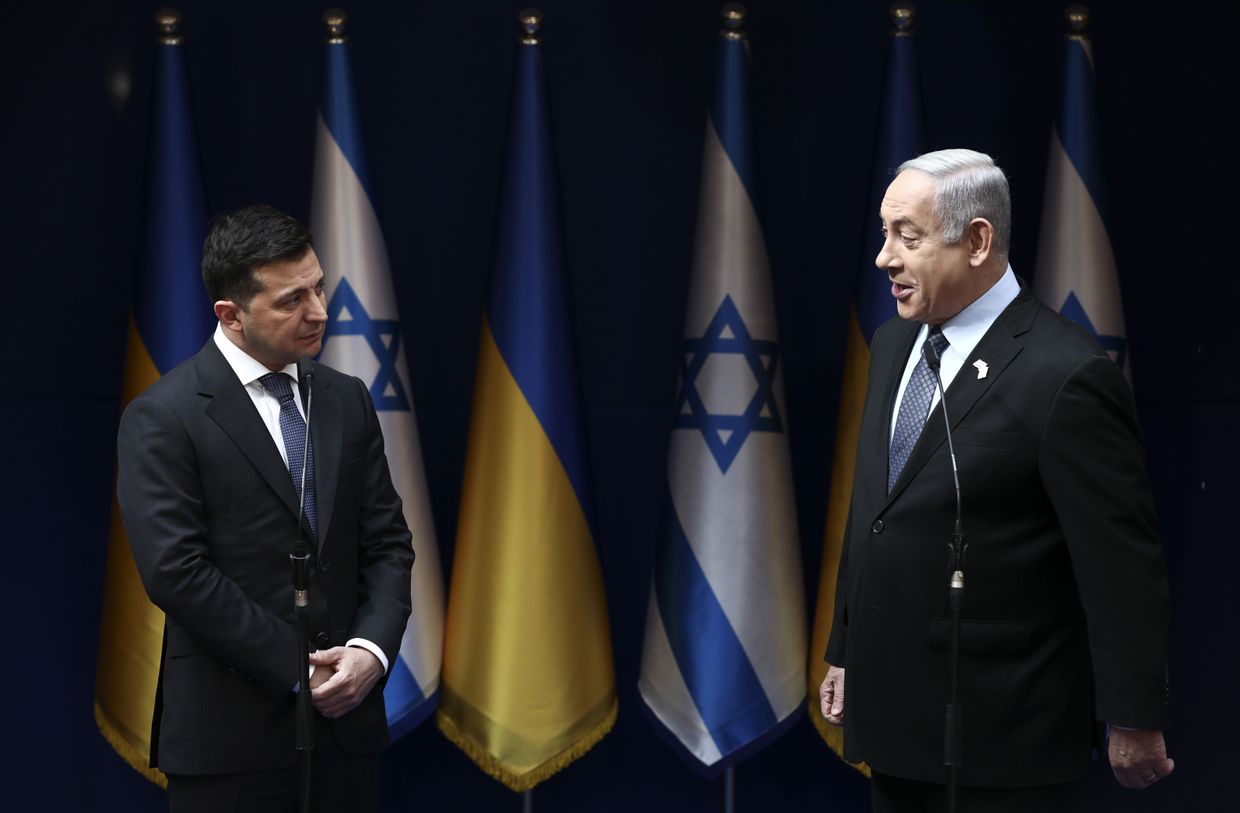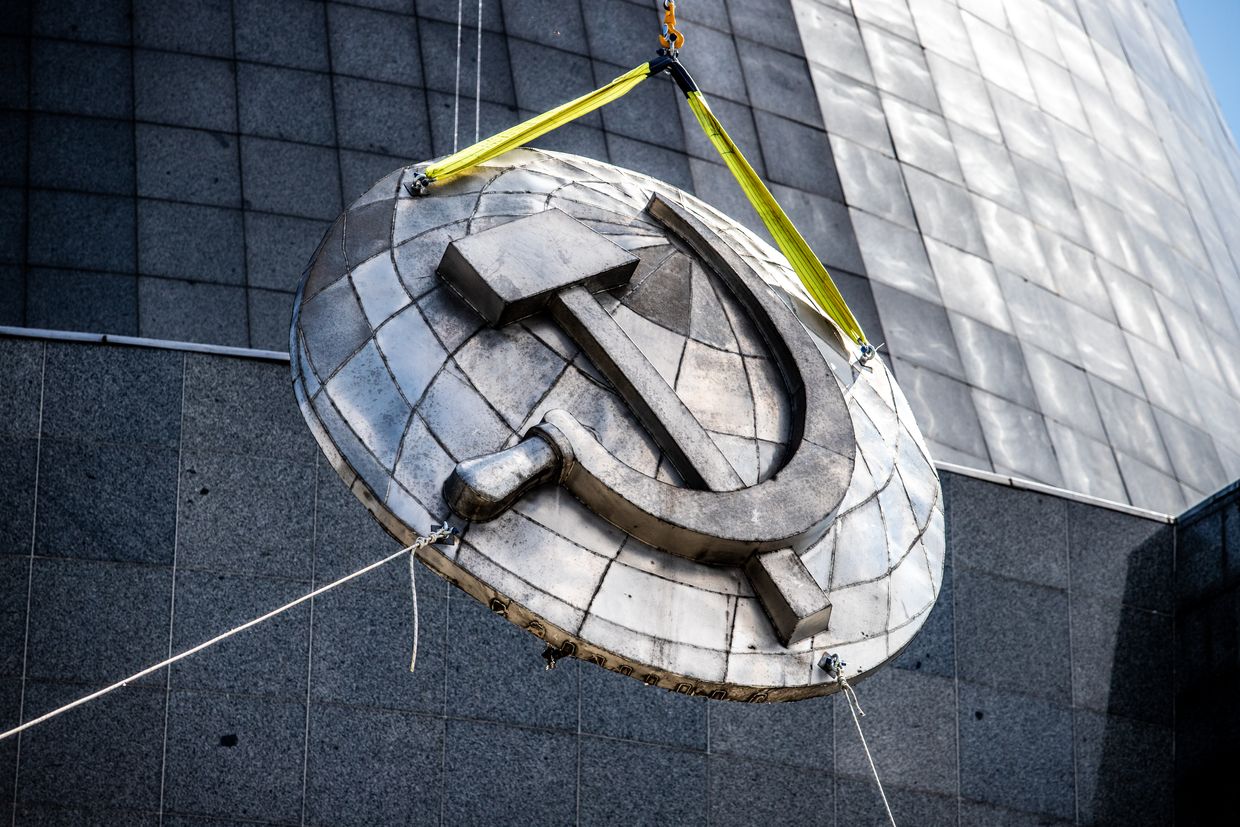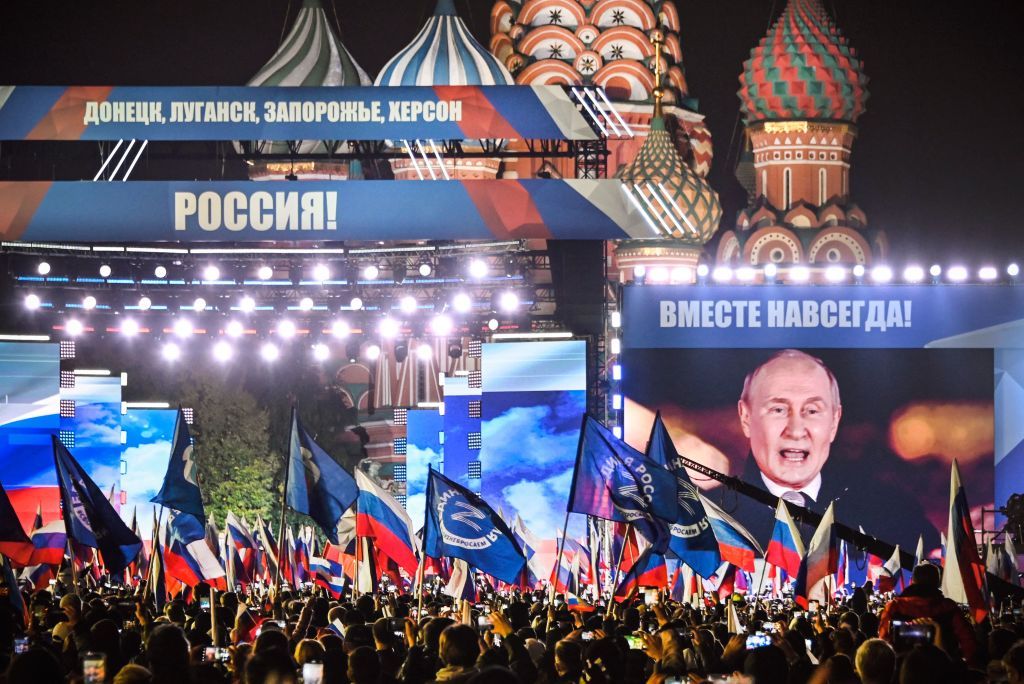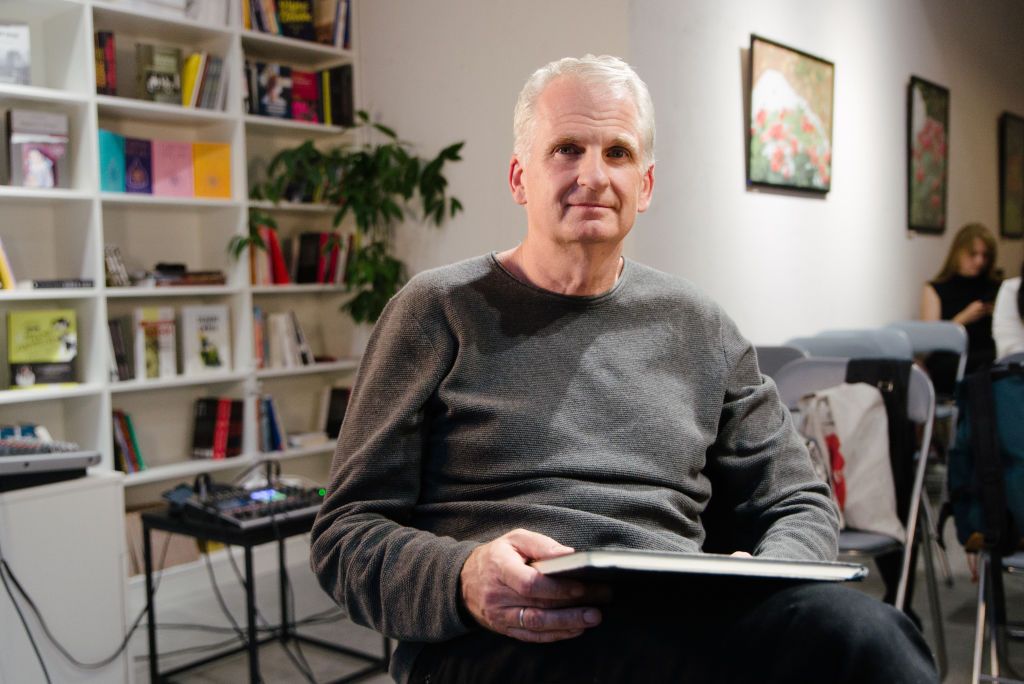Zelensky, Netanyahu's meeting in New York highlights their differences
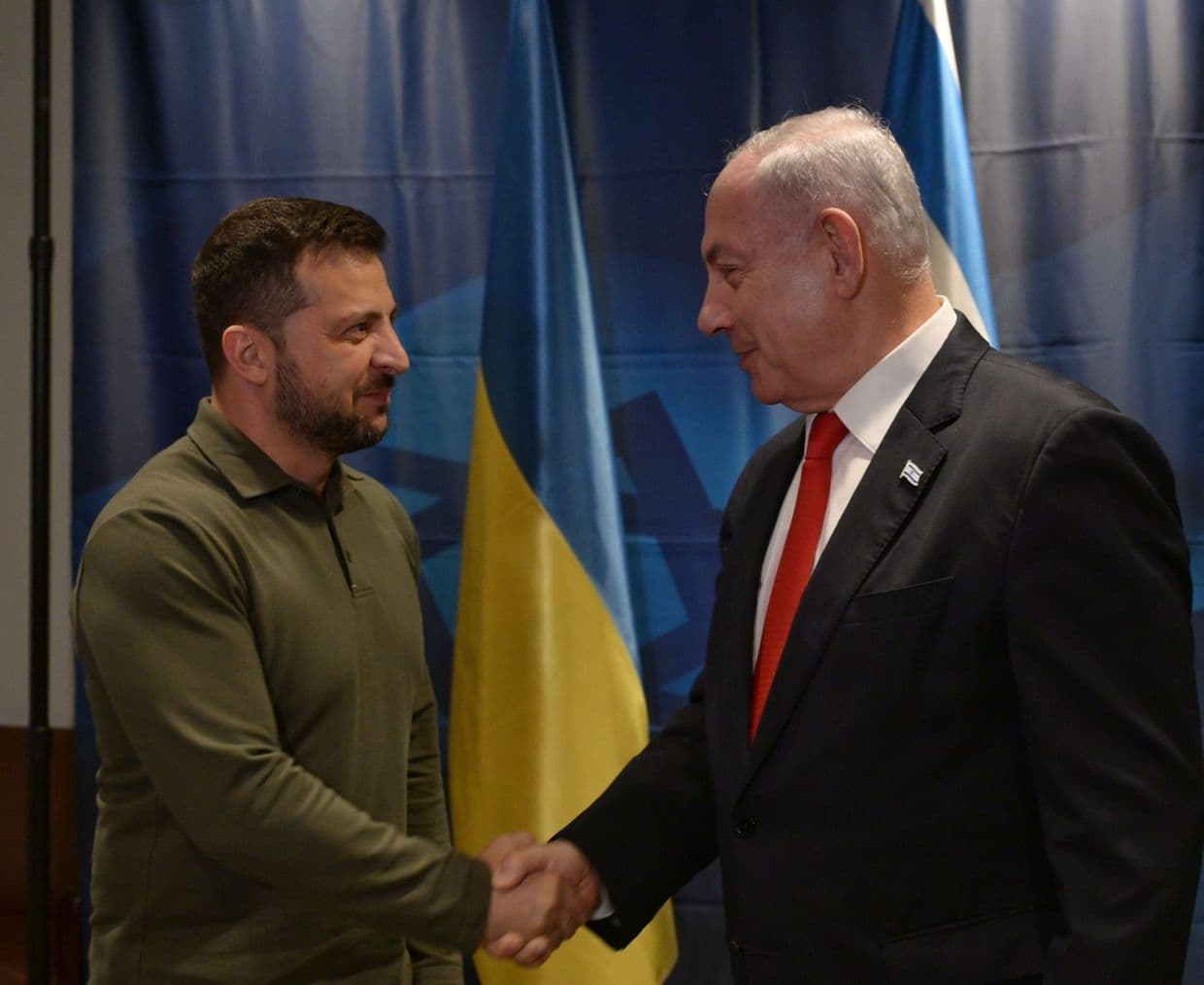
JERUSALEM — Following nearly two years of increasing tensions between Ukraine and Israel, President Volodymyr Zelensky met with Israeli Prime Minister Benjamin Netanyahu on the sidelines of the United Nations General Assembly on Sept. 19.
Their talk, at which Netanyahu's staff nearly caused a diplomatic incident by bringing a Soviet-era map that did not display Ukraine, was the first face-to-face encounter between the two countries' leaders since the beginning of Russia's full-scale invasion last February.
During this time, Israel has come under increasing criticism from Kyiv over its persistent refusal to supply air defense systems or other military aid.
And while Netanyahu promised that his country will "continue to help Ukraine on humanitarian matters, including dealing with anti-personnel mines," his declaration fell far short of the level of support requested by his Ukrainian counterpart.
Their meeting also showed that little can be done to align the two countries.
Drifting right
Critics have long charged that Netanyahu's foreign policy has prioritized realpolitik over ethical concerns, particularly those relating to human rights, antisemitism, and Holocaust memory.
This is especially true in central and eastern Europe, where his efforts have focused on creating a counterweight to western members of the European Union critical of Israel's settlement policies and approach to the Palestinians.
In pursuit of this goal, Netanyahu – who diplomats say has caused immeasurable damage to Israel's foreign service—recently begun making overtures to the European far-right.
Most recently, Israel's ambassador to Romania met with the leader of the ultranationalist and antisemitic Alliance for the Union of Romanians (AUR) party, drawing condemnations from domestic critics as well as Bucharest itself.
In a public statement, the country's official Holocaust research institute accused Israel of promoting a policy which "harms the memory of the victims of the Holocaust."
Meanwhile, even if its Ukraine policy hasn't been a major source of tension with the West, Israel's relations with Washington and other Western capitals have suffered under Netanyahu due to his inclusion of previously out-of-bounds far-right parties in his coalition and his advancement of a judicial overhaul which many believe will damage Israeli democracy.
And while many Israelis oppose arming Ukraine, despite being generally supportive of Kyiv, Netanyahu's foreign policy is wildly unpopular overall, with many believing the prime minister is damaging Israel on the world stage despite recent successes in normalizing relations with the Arab world.
Sitting it out
Over the past 19 months of full-scale war, Israel has rebuffed multiple Ukrainian calls for anti-missile systems such as the Iron Dome, stating that such a move would harm its own national security and could even endanger Russia's large Jewish community, which has faced official pressure to support the war.
"Israel has reasons to behave this way," explained Dr. Samuel Barnai, an academic at the Hebrew University and a board member of the Israel Council on Foreign Relations.
"There is quite a big Jewish community in Russia, and we know the Russians are trying to play this card," he said, citing Kremlin moves to shutter the Jewish Agency, the organization responsible for immigration to Israel, in the midst of a massive Jewish exodus from the country.
Israel is also likely reluctant to become too involved due to the fact that criticism of Russian revanchism could lead to criticism of Israel's own occupation in the West Bank, even if that occurred under different circumstances and is not directly comparable, "so we found ourselves in the company of the bad guys," he declared.
Speaking on condition of anonymity, an Israeli source with knowledge of the matter told the Kyiv Independent that Russia's military presence in Syria was the primary driver of Jerusalem's current policy, stating that the two sides had established "a special connection" following Moscow's 2015 deployment of anti-aircraft systems close to Israel's borders.
"So the main goal is not to harm this deconfliction mechanism which was established with the Russians which enables us more or less freedom of action in Syria," he said, referring to Israeli airstrikes against Hezbollah and Iranian targets there.
The source also echoed Netanyahu's insistence that Israeli weapons provided to Ukraine could end up in the hands of Israel's enemies if captured on the battlefield due to increasing Russo-Iranian cooperation.
He added that Russia remained a serious player in Syria despite the pullout of some troops, both arguments which have met with derision in Kyiv.
Israel's approach to the conflict has been fairly consistent under two consecutive governments, that of Netanyahu and his predecessors Naftali Bennett and Yair Lapid—who served as Foreign Minister before replacing Bennett in a rotation deal.
Lapid was frequently the one to speak out against Russia while Bennett remained silent in a sort of "good-cop, bad-cop" routine, said Dr. Maya Sion Tzidkiyahu, the director of the Israel-Europe program at the Mitvim foreign policy think tank.
"When Netanyahu came to power, he didn't have those two voices to speak with. He only had one voice, and that was the voice of Bennett. We don't condemn the Russians, we don't mention their name. But I don't think they took a step backward or forward in any direction," Sion Tzidkiyahu said.
"They kind of, I think, took the Bennett road, and there was no good cop to conceal or equalize the voices," she added.
On Moscow's good side
With few exceptions, such as following the massacre of Ukrainian civilians in Bucha, Jerusalem refrained from criticizing Moscow too harshly, even when its forces destroyed Jewish sites, including a Holocaust memorial, in Kharkiv.
This reticence did not apply to what Israeli leaders saw as overt Holocaust revisionism and antisemitism, with Israel slamming Zelensky for comparing Russian actions to those of the Nazis – and condemning the Russian Foreign Minister Sergei Lavrov for comparing Zelensky to Hitler.
Little criticism has followed, however, when Putin famously declared he was invading to "denazify" Ukraine. Russian troops have been repeatedly accused of carrying out widespread war crimes.
Israel has shown some limits even when confronted with increasingly antisemitic statements emanating from the Kremlin, failing to respond to a number of high-profile incidents.
Little criticism followed, when Putin famously declared he was invading to "denazify" Ukraine. Russian troops have been repeatedly accused of carrying out widespread war crimes.
This reluctance to wade into the conflict has raised Kyiv's ire, as have Israel's treatment of some Ukrainian refugees and the failure of three separate prime ministers to show solidarity by visiting Kyiv.
These disagreements have led to rapidly escalating condemnations from the Ukrainian embassy in Tel Aviv, which in June accused Israel of a "blatant disregard for moral boundaries" and adopting "a clear pro-Russian position."
By August, the embassy was threatening to cancel the annual Jewish pilgrimage to the central Ukrainian city of Uman, and in September, after Jerusalem clinched a cooperation agreement with Moscow in the field of cinema, the embassy accused Israel of "collaborating with this ruthless country, well known for its cinematic endeavors aimed at spreading war propaganda."
Despite the war of words, however, the pilgrimage did go through, and the tensions remain mostly "rhetoric," the Israeli source told the Kyiv Independent, pointing out that while "at least some information and probably some technologies have been transferred to Ukraine, probably via third countries."
"It has happened already. It is happening," the source said, adding that Jerusalem is currently helping to develop an early warning system to augment Ukraine's civil defense efforts.
Under the previous government, Israel developed a policy of providing humanitarian aid, including establishing a field hospital and donating body armor for rescue workers, while eschewing the provision of any overtly military supplies.
Despite Kyiv's criticism that Israel's help hasn't gone far enough, the country usually "doesn't get involved in conflicts outside its zone," Mitvim's Tzidkiyahu told the Kyiv Independent.
"So it was not necessary for Israel to change its mind because there was no real pressure from Europe, no real pressure from the United States for us to take a different stance."


